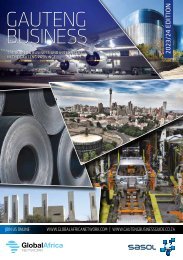South African Business 2019 edition
The 2019 edition of South African Business is the seventh edition of this annual guide to business and investment in South Africa. Regular pages cover all the main economic sectors of the South African economy and give a snapshot of each of the country’s provincial economies. Feature articles on topical issues such as Special Economic Zones and African trade provide unique insights, together with comprehensive overviews of critical economic sectors. Other special features focus on the exciting new possibilities in renewable energy, airports as engines of regional growth and the maritime sector as an entirely new prospect for South African entrepreneurs and businesses. South African Business is complemented by nine regional publications covering the business and investment environment in each of South Africa’s provinces. The e-book editions can be viewed at www.globalafricanetwork.com
The 2019 edition of South African Business is the seventh edition of this annual guide to business and investment in South Africa.
Regular pages cover all the main economic sectors of the South African economy and give a snapshot of each of the country’s provincial economies. Feature articles on topical issues such as Special Economic Zones and African trade provide unique insights, together with comprehensive overviews of critical economic sectors. Other special features focus on the exciting new possibilities in renewable energy, airports as engines of regional growth and the maritime sector as an entirely new prospect for South African entrepreneurs and businesses.
South African Business is complemented by nine regional publications covering the business and investment environment in each of South Africa’s provinces. The e-book editions can be viewed at www.globalafricanetwork.com
You also want an ePaper? Increase the reach of your titles
YUMPU automatically turns print PDFs into web optimized ePapers that Google loves.
OVERVIEW<br />
Development finance and<br />
SMME support<br />
Prompt payment is vital for small businesses.<br />
SECTOR INSIGHT<br />
SAB aims to create 10 000<br />
jobs by 2022.<br />
Portia Mngomezulu, the founder and managing director of<br />
Portia M, told the host of a radio business show in 2018 that<br />
one of the most important factors in allowing her to scale up<br />
her skin products business was the willingness of Pick n Pay<br />
to pay her within seven days.<br />
The entrepreneur was named in 2018 as Pick n Pay’s Small Supplier<br />
of the Year and her sales topped R10-million. From an initial investment<br />
of R200, she now employs 27 full-time staff and her range of products<br />
is available in four <strong>African</strong> countries outside <strong>South</strong> Africa.<br />
One of biggest problems faced by small, medium and microenterprises<br />
(SMMEs) is cash flow. Most government departments have<br />
rules about procurement which are biased in favour of purchasing<br />
from SMMEs or co-operatives. However, for many <strong>South</strong> <strong>African</strong><br />
entrepreneurs, the inability or unwillingness of government to pay<br />
within 30 days presents a major risk to sustainability. The Enterprise<br />
and Supplier Development (ESD) Programme of Pick n Pay addresses<br />
and goes a step further with the seven-day rule.<br />
Public procurement from township enterprises from provincial and<br />
municipal governments in Gauteng, the province where more than half<br />
of the country’s SMMEs are located,<br />
increased in 2017 to R17-billion, up<br />
from just R600-million in 2014. This<br />
expenditure has allowed many<br />
township businesses to enter the<br />
formal economy and for them to<br />
become more sustainable. The City<br />
of Johannesburg runs seven SMME<br />
hubs where office space, Wifi and<br />
advice and training are available for<br />
small business operators.<br />
All <strong>South</strong> <strong>African</strong> retailers<br />
have ESD programmes which<br />
typically create or support small<br />
businesses along their supply<br />
chain. A small community in rural<br />
Mpumalanga is remote and<br />
difficult to get to, but 13 farmers<br />
at Elukwatini Farm sell tomatoes<br />
to Woolworths. According to a<br />
<strong>Business</strong> Day report, Woolworths<br />
works through Technoserve (an<br />
NPO) and Qutom (a large supplier)<br />
for produce to be collected.<br />
De Beers Venetia Mine in<br />
northern Limpopo has chosen<br />
the transport of its workers as an<br />
area for business creation. Two<br />
small bus businesses servicing<br />
its labour-sending areas have<br />
been created with a wide range<br />
of ownership and with potential<br />
to expand.<br />
SOUTH AFRICAN BUSINESS <strong>2019</strong><br />
144


















